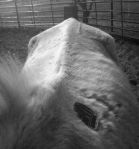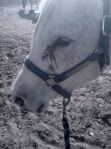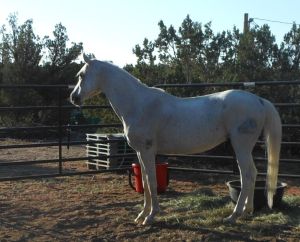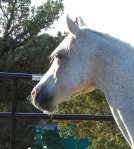
Lucky was named Lucky because he was dumped in the desert on the Mexican border seven months ago with about 40 other half-dead horses. How this could possibly be “lucky” sounds like a mystery, I know, but had his trailer-load of horses bound for slaughter in Mexico crossed that border, what little meat there was left on Lucky’s emaciated body would now most likely be digesting in the gut of some person in France… or flowing along the rivers of waste below the city of Paris. A noble equine life wasted.
The horses were dumped because several had a disease known as strangles, which can be a death sentence for horses, is highly contagious, and is certainly not acceptable for animals intended for human consumption. It was no doubt far cheaper for the hauler to release them into the desert than to try to sell them or park them somewhere.
We don’t know the whole story, and surely many of these horses perished, but Lucky was picked out of the herd in a holding pen by a teenage girl as a “gift” from a benefactor who often rescued some of these poor critters.
This girl herself had a rare gift with horses,  and she must have seen some spark in the eye of this little horse the day she chose him,
and she must have seen some spark in the eye of this little horse the day she chose him, ![]() even though that “eye” reflected such poor health and resignation.
even though that “eye” reflected such poor health and resignation.
Supposedly Lucky was only six, so that was in his favor. And he didn’t have strangles, so that was a double-plus. So off he went for rescue and rehab at the girl’s family’s stables, where they regularly took in as many of his kind as possible, brought them back to life, and placed them in good homes.
Fast forward to July of 2012 when Lucky arrived in Nambe, New Mexico, just north of Santa Fe, and was picked up by his new owner, my dear friend Cindy. Cindy had been looking for an appropriate companion for her only-horse, Nova, and, once again, there was just something about Lucky’s pictures that made her staunchly committed to giving him a permanent, forever home. He had been through months of rehab with his rescuers, Cindy’s friends, and had even recently survived a life-threatening round of severe colic. But Cindy never waivered. She was absolutely, positively sure that he was the one for her and her four-year-old mare, Nova.
Cindy began researching the little guy, posted pictures of the strange markings on his left side, and thereby learned much about his probable heritage. She found out that these marks are known as “blotch brands” and are Navajo in origin. (Cindy says they should be called botched brands because they are so messed up–no doubt due to improperly restraining the horse during branding.) The hip brand traditionally has three overlaid images which reflect the tribe, the land, and the family of the horse, so it’s easy to see how that brand alone could easily be “smeared” and hard to read. There are also often many other smaller markings/blotch-brands on a Navajo pony, of which Lucky has at least two, one of which looks like a face.
She found out that these marks are known as “blotch brands” and are Navajo in origin. (Cindy says they should be called botched brands because they are so messed up–no doubt due to improperly restraining the horse during branding.) The hip brand traditionally has three overlaid images which reflect the tribe, the land, and the family of the horse, so it’s easy to see how that brand alone could easily be “smeared” and hard to read. There are also often many other smaller markings/blotch-brands on a Navajo pony, of which Lucky has at least two, one of which looks like a face.
One Navajo horse trainer offered further description: “If you can ride him bareback with a halter, and he can’t back up, then he’s off the Navajo Reservation.” Later, responding to Cindy’s horrified message that this horse had been sold for slaughter, probably for $100 or less, he said, “You haven’t seen poor until you’ve been on the rez.”
Due to the drought, hay prices, and the economy, horses are being given away, sold for slaughter, or just turned loose these days by folks who are far more prosperous than those on the rez, so no, it is no wonder that Lucky ended up on that truck bound for Mexico. Still, I like to imagine little children on him, riding bareback with just a halter, and that his family was bereft to give him up. But that $100 sale price to them probably meant at least a few months of staples for their larder. It’s hard for any of us reading this to relate to that, but it certainly is a fact of life for many, and definitely for many of those among the Native American population of our country.
So Lucky lucked out and finally made it “home,” just one week ago. He was shaking all over as we started to unload him, but when he stepped out of the trailer, all of that went away and one could feel a total sea change in his being: he KNEW. We humans have epiphanous moments, why shouldn’t the animals? We could feel Lucky registering that this was his home, forever. It felt familiar being back in the high desert of New Mexico, and he immediately went into a place of total trust, relaxation and appreciation for the patient woman who stood murmuring quietly by his side.
In the last seven days, Lucky has flourished. He is on ten acres with one to two hours of at-liberty time each day to move freely, test the legs he hasn’t had a chance to use in a long, long time, and to graze on familiar stubbly, native desert grasses. But he also has his own pen with plenty of hay and feed. He is so thankful for this bounty that he went back into his pen, unprompted, all by himself, the first day he was turned out, after only an hour and a half. And he glues himself to Cindy whenever she is with him, following her from chore to chore, muck to muck. He knows. He had an epiphany. He understands and is grateful.
Other things Cindy has learned: Many of the rez horses date back to the original Arabian breed of ancient lore— the type that slept in tents with the Bedouins. A rare type these days because they are so calm and devoted, not as “hot” as many of their modern-day counterparts. Considering Lucky’s head, conformation, size and disposition, he certainly fits this mold. According to her vet, he is 11 years old, not six, which is just fine with her and will only help stabilize her four-year-old filly’s adolescent ways. And he has a spirit that can survive things most of us don’t even want to think about.
the type that slept in tents with the Bedouins. A rare type these days because they are so calm and devoted, not as “hot” as many of their modern-day counterparts. Considering Lucky’s head, conformation, size and disposition, he certainly fits this mold. According to her vet, he is 11 years old, not six, which is just fine with her and will only help stabilize her four-year-old filly’s adolescent ways. And he has a spirit that can survive things most of us don’t even want to think about.
Lucky has been renamed “Sharif” (pronounced “Shar-EEF”) honoring all the traits he bears from his long-distant ancestry: nobility, honor, gentleness. He still needs to gain more weight and rebuild muscle, but no doubt one day soon Cindy will be able to find out if he can be ridden “bareback, with just a halter” (though by then she will have taught him to back up!).
Sharif is one of the lucky ones. So many horses, dogs and cats are being discarded these days due to lack of resources to take care of them. I hope Sharif’s story will inspire others like Cindy to step up and rescue or sponsor just one animal who would otherwise be lost. In this case, I don’t know who lucked out the most: Sharif or Cindy. She agrees.

Recent Comments